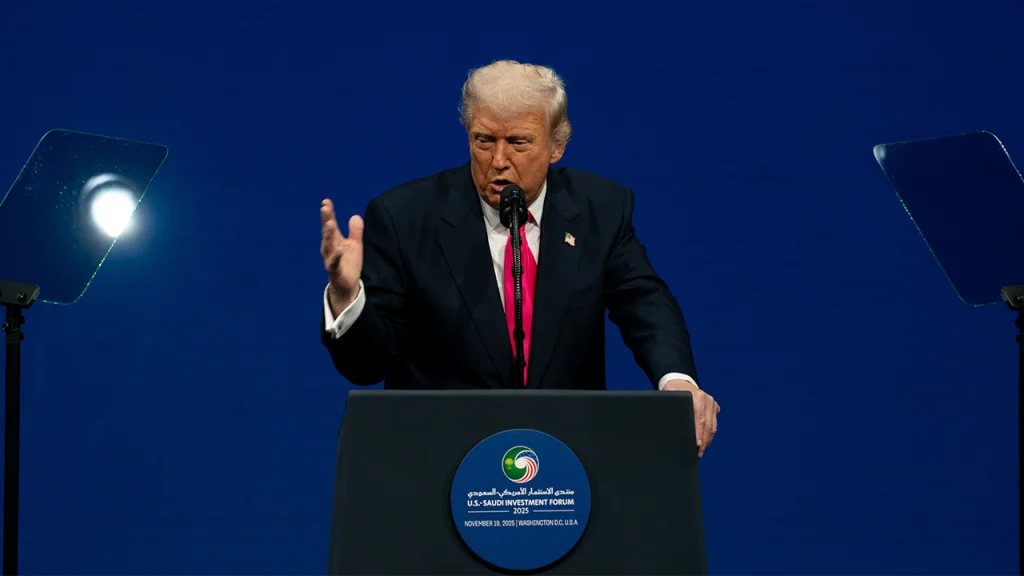Trump’s Comments on Transgender Athletes Draw Attention at U.S.-Saudi Investment Forum
In a speech that captured international attention, former President Donald Trump addressed cultural differences between the United States and Saudi Arabia during the U.S.-Saudi Investment Forum at the Kennedy Center on Wednesday. Trump’s remarks centered on transgender athletes in women’s sports, a contentious issue in American politics that he suggested bewildered his Saudi guests. “The Saudis are saying, ‘What is he talking about?'” Trump remarked, referring to the concept of transgender athletes competing in women’s sports. “They’re saying, ‘What do you mean women are playing against men? No, that doesn’t happen, does it?’ Yeah, it does.” His comments highlighted the cultural divide on gender identity issues between the two nations while touching on a debate that continues to divide American society.
Trump specifically described a scenario involving a transgender weightlifter who broke a women’s record, claiming the athlete was “119 pounds higher than a woman champion” and had been “an average lifter prior to transitioning.” This anecdote formed the centerpiece of his argument that allowing transgender women to compete in women’s sports creates unfair competition. “A lot of the Saudis are sitting here saying, ‘What the hell is he talking about — transitioning?'” Trump continued, emphasizing what he perceived as cultural confusion among the Saudi attendees. He added that unlike the United States, “they don’t do a lot of transitioning” in Saudi Arabia, framing the issue as uniquely American and, in his view, problematic.
The former president’s comments come amid ongoing legal battles over transgender participation in sports across the United States. He referenced congressional activity on the matter, indirectly alluding to a recent amicus brief filed by 130 Democratic lawmakers urging the Supreme Court to rule in favor of transgender athletes challenging state laws that restrict their participation. This group of lawmakers includes prominent Democrats such as Representatives Alexandria Ocasio-Cortez and Ilhan Omar, as well as House Minority Leader Hakeem Jeffries and former Speaker Nancy Pelosi. Their support for transgender athletes’ right to compete according to their gender identity stands in stark contrast to Trump’s position and that of many Republican lawmakers who have advanced legislation restricting such participation.
Public opinion on this issue appears more complex than the partisan political divide might suggest. Trump’s comments align with findings from a January New York Times/Ipsos survey that revealed broad skepticism about transgender women competing in women’s sports. The poll of over 2,000 participants found that 79% of Americans believe biological males who identify as women should not compete against women in sports. Notably, this view crossed party lines, with 67% of those identifying as Democrats or leaning Democratic sharing this position. This suggests that while the issue has become politically polarized at the legislative level, there exists significant bipartisan public concern about competitive fairness in women’s athletics.
The former president’s choice to highlight this issue at an international investment forum demonstrates how cultural and social policy differences have become intertwined with diplomatic and economic relations. By framing transgender inclusion policies as something that Saudi visitors find perplexing or “crazy,” Trump positioned himself as aligned with more traditional gender views that might resonate with both conservative Americans and international partners from countries with stricter gender norms. This rhetorical approach serves to simultaneously criticize progressive policies on gender while suggesting that American positions on transgender rights may harm the country’s standing or credibility with certain international partners.
The incident illustrates the complex intersection of sports, gender identity, international relations, and domestic politics in contemporary America. While transgender rights advocates argue that inclusive policies are essential for dignity and equal treatment, opponents contend that biological differences create inherent competitive advantages that compromise women’s sports. As this debate continues to unfold in courts, legislative chambers, and international forums, it represents one of many cultural flashpoints where Americans are wrestling with evolving understandings of gender and the proper balance between inclusion and competitive fairness. Trump’s comments, whatever one’s view of their appropriateness at an investment forum, highlight how deeply these questions have penetrated American political discourse and how they can affect the country’s image abroad.













